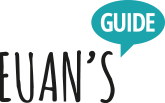Top 10 ways to make your venue more accessible


Taking steps to make your venue more accessible is beneficial to everyone – from shops trying to increase sales to attractions aiming to increase footfall; and from wheelchair users to young parents out and about with prams. Here are our top tips for making your venue as accessible to as many people as possible.
1. List your venue on Euan’s Guide
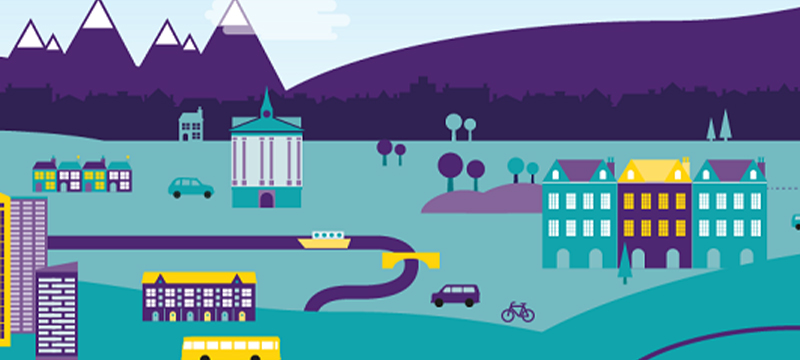
Image of: Generic cityscape in Euan's Guide colours.
Listing your venue on Euan’s Guide gives you the opportunity to list any access information for potential visitors together in one place. Telling people what you do have is a great way to make people less anxious about visiting. It may be that while you don’t have wheelchair access, you do have great facilities for people with a hearing impairment, such as an induction loop around your room. Not all buildings have the capacity to be fully accessible to everyone though, so be honest and don’t exaggerate how accessible your venue is – this way customers will be more likely to visit you again!
2. Write an access guide – that’s accessible!
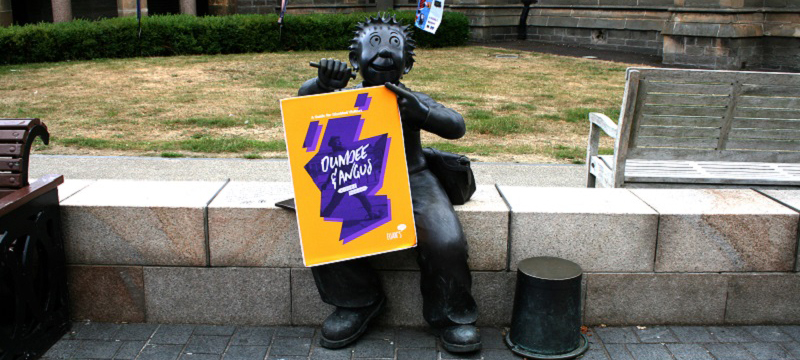
Image of: Oor Wullie statue in Dundee holding the Euan's Guide Dundee and Angus travel guide.
People are unlikely to assume that your venue has good access, so it is a good idea to tell potential visitors about your facilities. Before visiting a new place for the first time, disabled people will often look for information about what to expect when they arrive, including whether your space includes features such an accessible toilet, level access or good signage. Information about parking and public transport is particularly helpful as well. If people can find this information, they are more likely to visit – and don’t be surprised if they return again and again! The city of Derry produced a guide to accessible routes around town – if any resources like this exist for your town or city be sure to find them as well.
Having easy to find accessibility information on your website is another great way to share information with potential visitors. You can improve the accessibility of this information by making it available in large print, audio format, or as a downloadable document. If people can download the information, they can then print it and carry it with them. Visitors can also put the download into software that transforms the information into an accessible format appropriate for them! If you want to go one step further, sharing a link to an access statement on your website is a great way to inform visitors fully about what facilities you offer. It’s always a nice surprise to find a dedicated statement or guide to a venue’s accessible features!
3. Support and train your staff

Image of: People's arms on a table, some of them are taking notes.
Our reviewers repeatedly tell us that their best experiences have come from great staff and excellent service. A large part of being accessible is to be friendly and as helpful as possible. Be welcoming to customers and aim to make sure that nothing is ‘tricky’ - instead offer the best solutions to any issues that may arise.
Your staff may need some support regarding accessibility as they may not have had any experience of disabled access before. Enable your staff to feel confident, and not anxious, by providing training which leads to a warm welcome for everyone. Ensure that staff know how to provide help and assistance when needed – even if it is a small gesture such as carrying a coffee to a table. Good access is not just about facilities, it’s also about being friendly and inviting.
4. Engage with your customers
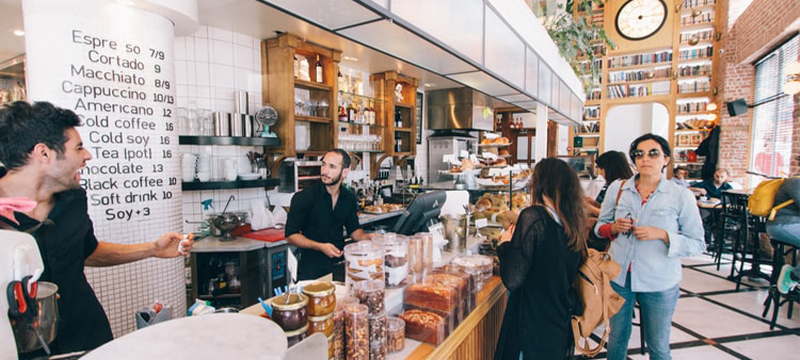
Image of: People being served at a counter.
Include your customers by talking to them and finding out from personal experiences how you can improve access in your venue. Just as reviewers on Euan’s Guide can give advice based on their perspective, so too can your customers. Invite feedback on accessible features that your customers look for or use, and encourage them to share their experiences by reviewing on Euan’s Guide. It may be a nice gesture to offer an incentive or thanks for their time, such as loyalty card stamps or a free sample for example.
5. Make the most of your accessible toilet
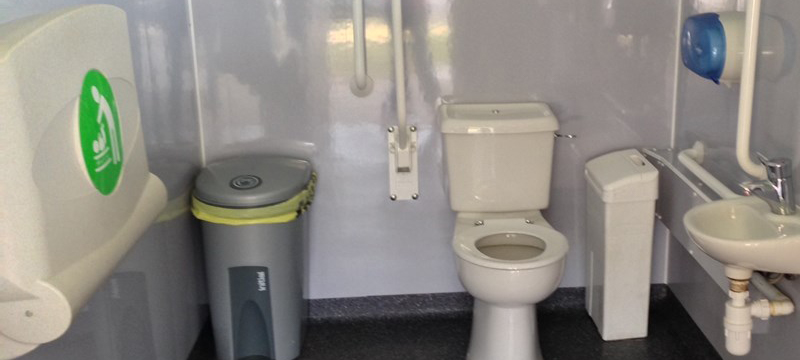
Image of: An accessible toilet with grab rails.
They may not be exciting, but toilet facilities often make or break the decision to visit somewhere new. If your space is limited, remove any unnecessary items such as oversized bins or decorations. Avoid using an accessible toilet as storage area, as empty space is a feature which customers may need to use. Check to see that everything is easily reachable – are the paper towels beside the sink? Attach a red cord card to your toilet alarm cord – this will highlight the importance of alarm cords to people using or cleaning the facility. Consider looking at a Changing Places toilet for your venue. Accessible toilets can be stylish, colourful or bold - so use your creativity and reflect your venue's style.
6. Be creative with your space
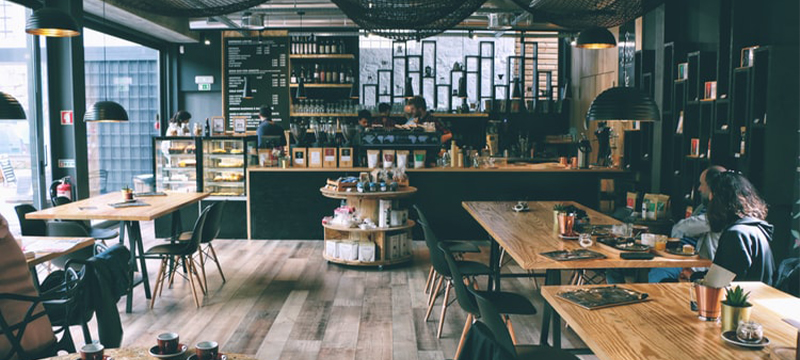
Image of: Tables in a restaurant.
Like people, wheelchairs come in all different shapes and sizes, and wheelchair users need to be able to move around your venue in order to enjoy their experience and see what’s on offer. Aim to keep your floor space free of obstruction and have a clear path around the room. It’s good to have enough room in aisles for a wheelchair user and for somebody to pass. Loudons Café and Bakery in Edinburgh have a spacious dining space with moveable furniture and clear pathways. Remember to consider sightlines as well and whether or not a wheelchair user will be able to see what is coming up ahead.
Aim to keep your venue as bright as possible – dark environments can make it difficult for visually impaired visitors to read information or notice important signage. Where light levels are important for your environment, you can always illuminate signs. The London Canal Museum cleverly installed buttons for visually impaired visitors to turn on a timed light so that they may view light sensitive artefacts.
7. Check your signage
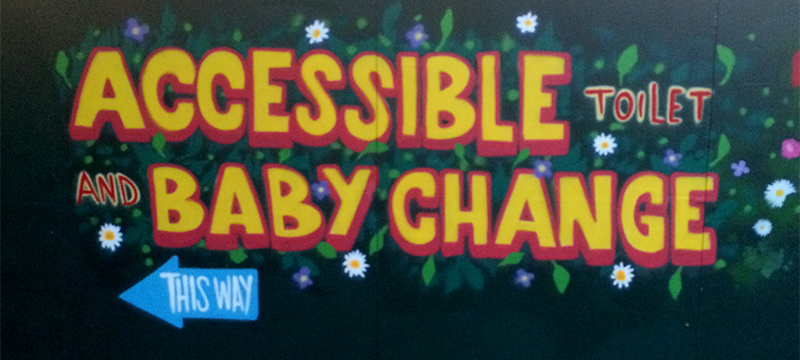
Image of: A mural with directions to the accessible toilet.
Signs are a very important feature that help all visitors to navigate your venue. Try to use high contrast text and keep signs clear and free of obstruction. Back in 2015, the Edinburgh Festival Fringe designed bold and colourful bathroom signage with clear arrows and text saying ‘this way’. If you are missing a sign, be sure to inform customers when they arrive of where the toilets, ramps or lifts are located, including alternative routes.
Signs are more informative when they have text directions as opposed to just an arrow. Make it abundantly clear where the sign is leading your visitors to, for example, ‘wheelchair ramp to the garden’. Don’t forget to consider the height and location of your signs as well; wheelchair users will not be able to clearly read signs that are positioned high up, and visually impaired people have to be able to reach tactile signs. Words and symbols are equally as important on signs – as long as the message is clear – and don’t be afraid to have fun with them! The Ryder Cup 2014 transformed generic bathroom symbols into lively golfers.
8. Fill up a water bowl
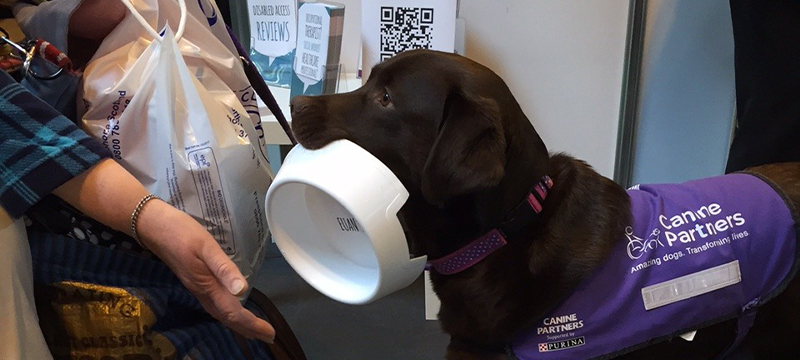
Image of: A canine partner holding a Euan's Guide dog bowl.
Visitors may be visiting your venue with an assistance dog. Be inclusive by offering to pour the dog some water; visitors may feel pressured to leave if their dog has gone a long time without something to drink. Euan’s Guide has guide dog bowls available for venues, check out our resources.
9. Be informed
Do you know where the nearest bus stop is, where those buses go, and if they are wheelchair accessible? Are you aware of the lifts into the local train station? Is there a park nearby where assistance dogs may go for a break? Being familiar with your immediate surroundings will come in handy if a disabled customer ever has a query. They have made an effort to visit your venue, so it helps to be considerate and have answers ready to help them move with ease to their next location – especially if they are new to the area.
10. Take part in Disabled Access Day
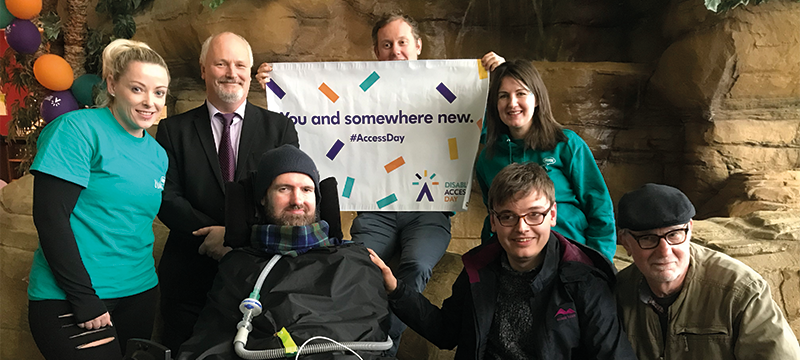
Image of: Euan and Kiki with friends at a Disabled Acccess Day event.
Disabled Access Day is a biennial event which encourages disabled people to get out and about by removing any uncertainty and anxiety they may have about going out and exploring new places. This can help prevent another level of stress being reached which can lead disabled people to not bother and turn back around. Offer an event at your venue to give people the opportunity to ‘try it out’ for the first time.
So now that you’ve begun your journey toward accessibility, why not take part in the next Disabled Access Day










 Follow Euan's Guide on Instagram
Follow Euan's Guide on Instagram
 Follow Euan's Guide on LinkedIn
Follow Euan's Guide on LinkedIn
 Follow Euan's Guide on Facebook
Follow Euan's Guide on Facebook
